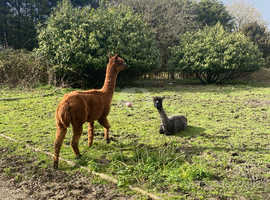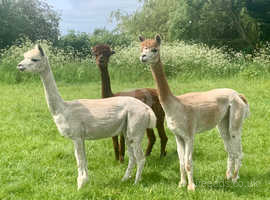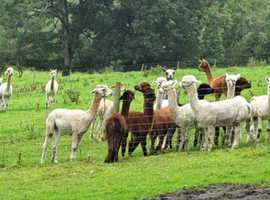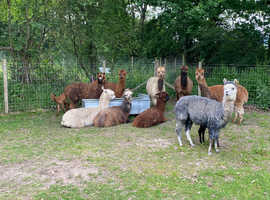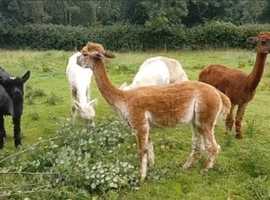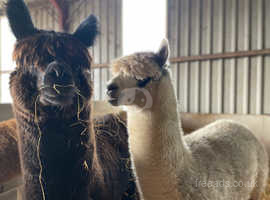This ad has already gone. Better luck next time
You may also like
ALPACA'S Female Huacaya BAS Registered Alpaca's Prices range from £450 - £2000 Discount on 2 and Above. in Harlow

Description:
Beautiful & Loving Soft to the touch BAS Registered Alpaca's, We have a beautiful selection of Female Huacaya BAS Registered Alpaca's For-sale. Prices range from £450 - £2000 we will reduce the price accordingly to the quantity, age of the alpaca.
Viewing by Appointment - Delivery can be arranged by our own transport or you may collect with your own suitable vehicle or Livestock trailer. If you have any questions please do not hesitate to get in touch.
FREQUENTLY ASKED QUESTIONS ABOUT ALPACA'S
How long do they live?
Alpacas Generally Live to between 15 and 25 years.
Are they good with other Animals?
Yes they are excellent with other animals especially at keeping Foxes away from Chickens, Geese, Ducks Etc, and also good with other livestock Sheep, Horses, Goats Etc.
How often are they sheared?
Once a year preferably in May, June, or July when the weather is warmer and when the fibre is around 5 inches long.
Are alpacas difficult to look after?
Not at all, they graze, eat hay, and pregnant / lactating females and all youngsters especially, require a daily supplement. Clean water is essential.
Do they need shelter?
This is optional, they are Hardy to our climate all year round, but a shelter can be useful at any time to provide shade in the summer and shelter from the worst winter weather.
Do they spit?
Spitting is a camelid's defence mechanism. Yes, they do spit, but not very often and even less often at humans.
LAND & ACCOMMODATION
Alpacas can thrive on poor pasture in their natural habitat, but will benefit from better pasture.
They are hardy and often prefer to winter out regardless of the weather. However free access to open fronted shelter in open windswept locations is essential. This will also offer summer shade if suitable hedging or trees are not available. In large fields, a large catch pen area should also be made, around the corner or in front of the field shelter. Daily feed routines within this area will ensure easy catching of the alpaca for training, routine husbandry or veterinary care.
TRANPORT
The vehicle or trailer must be suitable for the transport of animals with a height high enough for alpacas to stand. Alpacas usually lie down while travelling and so should not be tied to the side of the trailer.
Adequate stops, to allow alpacas to be watered and offered hay - this must be allowed during journeys over four hours.
HEALTH
Alpacas are on the whole hardy and healthy animals that suffer from very few health problems. Observation of the alpacas normal behaviour, habits and posture are in valuable guides to their well-being.
Routine Husbandry should be carried out every six months for the health and well-being of an alpaca.
HANDLING
Alpacas can be halter trained if taught with kindness and understanding during brief and frequent sessions. Always begin in a small grass paddock. Gently teach to walk towards a closed gate or into a trailer. Always encourage them to walk forward from behind.
Similar Ads
-
 VipMember2 alpacas for sale£350
VipMember2 alpacas for sale£350 -
 VipMemberAlpaca Cria's females£800
VipMemberAlpaca Cria's females£800 -
 VipMemberAlpaca Cria's males£600
VipMemberAlpaca Cria's males£600 -
 3 male alpacas£750
3 male alpacas£750 -
 2 male Alpaca weanlings 10 months old for sale£1,000
2 male Alpaca weanlings 10 months old for sale£1,000 -
 VipMemberFemale alpacas for sale cria available£450
VipMemberFemale alpacas for sale cria available£450 -
 Beautiful Alpacas for sale£350
Beautiful Alpacas for sale£350 -
 VipMemberA rare opportunity - Group of 10 walking alpacas...£800
VipMemberA rare opportunity - Group of 10 walking alpacas...£800 -
 VipMemberx3 Adult Females & x1 Cria for sale£3,000
VipMemberx3 Adult Females & x1 Cria for sale£3,000 -
 eggs incubator£60
eggs incubator£60 -
 Laying chickens£60
Laying chickens£60 -
 VipMemberAlpaca fleeces for sale, various colours, first an...£20
VipMemberAlpaca fleeces for sale, various colours, first an...£20 -
 VipMemberStunning, superior genetics, registered females re...£1,400
VipMemberStunning, superior genetics, registered females re...£1,400 -
 VipMemberAdorable young breeding females FROM £1,200 ...£1,200
VipMemberAdorable young breeding females FROM £1,200 ...£1,200 -
 VipMemberGorgeous, friendly group of 5 male, registered alp...£2,800
VipMemberGorgeous, friendly group of 5 male, registered alp...£2,800




